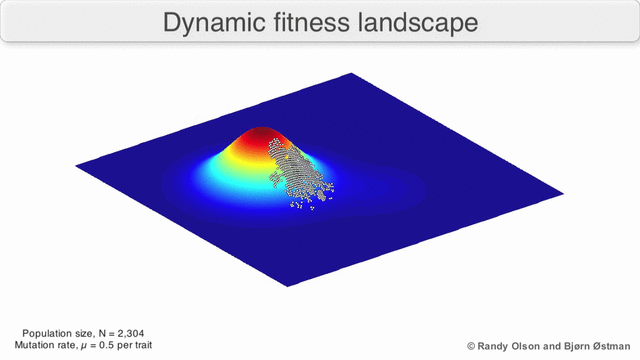
The main idea, as this Wikipedia GIF illustrates, is that agents look around, and then "hill climb" to the highest point that is near them. They then repeat this process until there is nowhere near them that is lower than them (that is, they are at a peak). In biology, peaks represent attributes with high reproductive success. In machine learning, they represent parameters with a better solution to a problem.
The result that you end up with (e.g., the attributes of an animal or the solution produced by a ML algorithm) depends on the fitness landscape, and on the location where you start. In general, you will end up at local, rather than global, peaks.
I think a lot about the interaction between technology and society, and I think that fitness landscapes can provide a useful way of thinking of them. Technology is sometimes talked about as though it causes certain political, cultural, or social outcomes. Alternatively, some people seem determined to act as though people act nearly independently of technology, and that technology is merely a tool.
I think that we can see the introduction of a new technology as a reshaping of the socio-cultural-political fitness landscape, so that some configurations become comparatively more costly or difficult to maintain (i.e., move lower) while others become more attractive or possible (i.e., move higher). Whether a given society will change their configuration is dependent on how much the landscape changes (e.g., if the landscape changes dramatically, then most configurations will change) and where they are located on the fitness landscape (e.g., if the peak they are on remains a local optimum, then they will stay, even if the overall landscape has changed a lot).
These ideas can be imperfectly mapped to real situations. For example, we could see a country with strong institutions and a stable culture as being at a rather high local peak. Technological changes would therefore be less likely to result in reconfigurations. Similarly, minor changes in technology may only alter the landscape in small ways, but those small changes may be enough to cause societies to change drastically (the arguments about Twitter causing the Arab Spring can be framed in these terms).
For me, at least, I think this is a nice framework for thinking about what's happening without resorting to simple cause and effect explanations.


